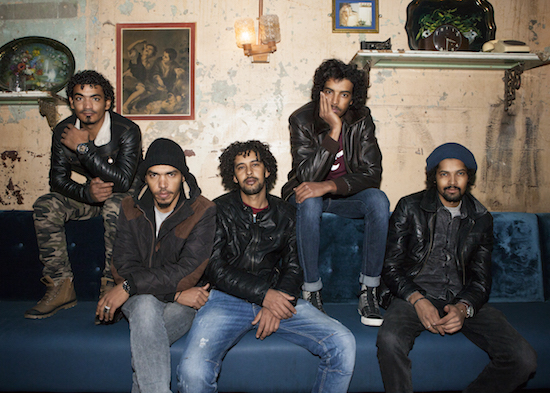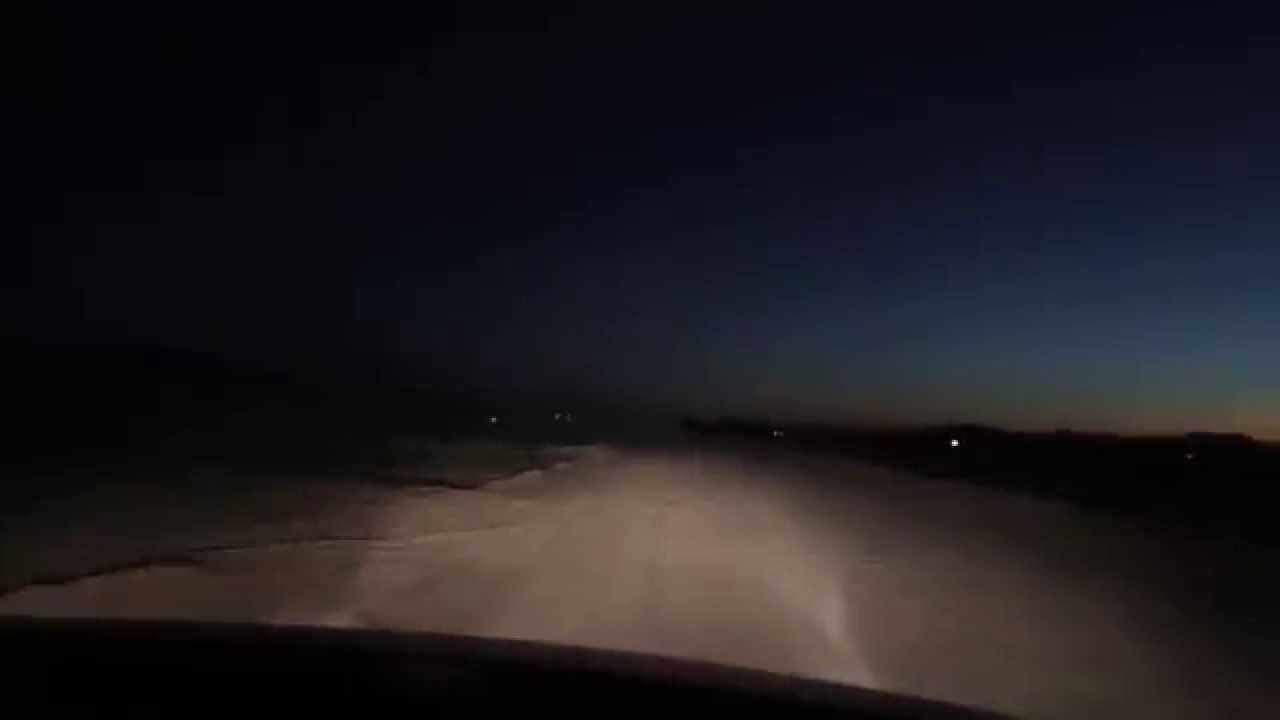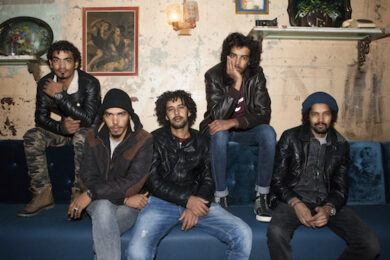"Imarhan’s music is based on the assouf and Tuareg traditional music – that is the most important, it is the real base," says frontman Iyad Moussa Ben Abderahmane, aka Sadam, on the sound of the Algerian desert rockers. While swapping allichu veils in favour of leather jackets and jeans, the six-piece group continue the rich folklore traditions of Tuareg musicians from across the Sahara. As Sadam explains: "Compared to other bands, as the new generation, we have been adding more modern elements that could come from rock or funk or any other kind of influences that will transcend the Tuareg music. We make music for the younger generation. And you can see that in our clothes. We don’t wear traditional clothes. We wear the clothes we wear in Tamanrasset every day. So the music and the style represent our generation."
Sadam describes the group’s home city in southern Algeria as "the centre of the Tuareg community", a place where they jam with friends and play regular shows for family weddings and festivals, like the Festival of the Hoggar – held in the desert around Tamanrasset. He adds: "There are Tuaregs in Mali, and also in Egypt, Algeria, Libya, and Tamanrasset is really like the centre of this Tuareg region. It is a long history of course. Many Tuaregs from northern Mali went to Libya at the time of Muammar Gaddafi, but that was a long time ago and they very soon came back to Mali, but many of them remained in Tamanrasset. When coming back to Mali they got accommodation in Tamanrasset."
The Quietus is speaking to Sadam via Skype from his hotel room in Normandy, where the group are playing a two-day residency ahead of the Rencontres Trans Musicales festival in Rennes. "It’s very important to us that we are able to bring the music of Imarhan to Europe and the rest of the world," he says. "We feel that there is a place for Tuareg music in the world. Of course there is Tinariwen today, but there is always the need for a new generation, so that no one forgets about Tuareg music. There is Tinariwen, and now there is Imarhan as well. There will be a new generation after Imarhan. It is very important to us that Tuareg music can be spread in the world."
While clearly indebted to Tinariwen, Imarhan’s close ties with their musical elders extend beyond influence. Over the last couple of years, when the conflict in northern Mali prevented some members of Tinariwen from going on the road, Sadam stepped in to join the Tuareg trailblazers’ touring line-up. In addition, Tinariwen bass player Eyadou Ag Leche is Sadam’s cousin and has both co-writing and production credits on Imarhan’s upcoming self-titled LP, recorded in the Parisian suburb of Montreuil in 2014. "Eyadou, and Tinariwen in general, have been helping the band since the start," says Sadam. "Especially regarding the fact that he wanted us to be the new generation of the Tuareg music – the young generation – and he has supported me a lot, and the whole band as well. For the last year and a half I have been playing live with Tinariwen and touring with the band regularly, which has helped my work with Imarhan a lot."
In addition to the influence of Tinariwen, Sadam cites other African inspirations, including Malian musicians Ali Farka Touré and Habib Koité and Algerian artists, like Allah. "We have always been listening to many other kinds of music," he says. "Jazz, blues, rock, anywhere we go. We don’t always remember the names of the artists that we are listening to."
The story of Imarhan’s beginnings is described by Sadam as "the story of six good friends". He says: "We have been friends since 2004, so for more than ten years now. We have always been listening to music, to the music of Tinariwen especially, and in 2006 we decided to create our band, Imarhan. The most important thing in the creation of the band is that it is a big friendship of music lovers and we come from the same city, from the same area, and since 2006 we have been playing all the time, all together. When we created the band it was originally called Imarhan N’Tinezraf. Imarhan means ‘the ones who care about me’, the very close friends. N’Tinezraf means ‘the desert’, a very dry desert. So Imarhan is the most important name, and that is why we kept this name after all. The main thing is the friendship."
While southern Algeria avoided much of the conflict that took place in its neighbouring Mali, the impact was still felt by Sadam and his bandmates. "Compared to northern Mali or Libya, Tamanrasset is a very quiet place," he says. "We were born in Tamanrasset and have grown up in Tamanrasset and we have never had any feelings of insecurity since we were born here. Some people may feel insecure, but the issues are not as big as in the north of Mali. Now the border of Algeria is also closed to Mali and to Niger, and Algeria is very secure compared to the other countries. But the fact is, the Tuareg community is a family, and we are suffering in solidarity for our family in northern Mali. We feel affected by the issues that the Tuareg community is facing in northern Mali. In Tamanrasset we are safe, but we are affected."
The handful of Imarhan tracks available at the time of speaking to the group combine stomping cowbell-led rockers with subtler moments of acoustic introspection and some lengthy atmospheric passages that are testament to the group’s decade of honing their musical craft and songwriting. "This album is a real resumé of Imarhan – our own story and our own style," says Sadam. "Each song has its own personality and it is really like the business card of Imarhan in a way, to present ourselves for our debut album. So again, the music is based on assouf music, but with many other influences. Each song on the album has a specific topic and the lyrics speak about love, they speak about the Tuareg life, they speak about social issues for Tuaregs, they speak about issues for Tuaregs, but also just the normal life of Tuareg people and about the desert. And, of course, the nature."
This closeness to the environment is apparent on first single, ‘Tahabort’, where hypnotic rolling riffs, sandy swagger and relentless percussion are cut through with post-punk-like staccato guitar rhythms in an arrangement filled with unexpected breakdowns. "’Tahabort’ is a market square in Tamanrasset, where all generations, all the Tuareg community, meet all the time, for partying, for chatting, or anything," explains Sadam. "So it is really a very lively place. The song is about what is happening on that square."
Having made their London debut at the end of last year at Cafe OTO supporting Nigerien musician Mdou Moctar, there are now plans for more European visits in support of the album. Not only do the recordings reveal a band comfortable in the studio, evidence of a heavy record to look forward to when City Slang release it in spring, but they signal a band assured in themselves. "The album was recorded very fast," Sadam explains. "We started to record last year and we recorded new songs in the past week, but everything has been recorded very quickly, very easily and the songs were there, the style was there."
Special thanks to Imarhan manager Marion Chapdelaine for translating.
Imarhan is out on April 29 via City Slang. The band begin a European tour at Festival GéNéRiQ on February 27 at Hôtel de Vogüé, Dijon and Les Sheds, Mulhouse, 28, before supporting Kurt Vile on March 10 at the Roundhouse, London and All Saints church, Hove, 11; for full details and tickets, head here




